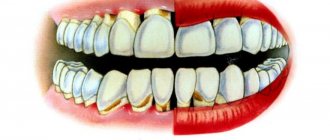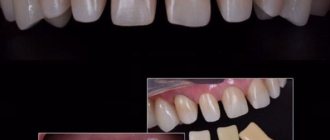What has an impact
The negative impact of smoking on teeth occurs for several reasons. Firstly, the oral cavity, including the gums, is affected by harmful substances from cigarettes. Smoking harms teeth and gums due to the presence of:
- Carbon oxides.
- Hydrocyanic acids.
- Resins and fatty compounds.
- Methane.
- Nicotine.
Toxic products slowly “corrode” teeth, leading to the formation of caries, enamel defects, and as a result, after smoking, teeth may begin to hurt and gums may bleed.
In addition to the direct negative impact of cigarette substances, the damaging factor is the high temperature of the air inhaled if a person starts smoking cigarettes, a pipe, etc. The temperature difference between the smoke and the environment will cause the appearance of microcracks, that is, caries appears. If a person has recently started smoking, a yellowish or brownish coating forms on the teeth; later, smokers develop dark spots, mainly at the root of the tooth.
Photo of plaque on a smoker's teeth
If we talk about the soft tissues of the mouth, then tar and nicotine from cigarettes are irritating, which leads to inflammation. The gums become more loose, reddened, irritated, and as a result, a complaint appears that the gums have begun to bleed. In addition, nicotine has a significant negative effect on the blood supply to the gums. Over time, the gums atrophy, the teeth cannot be fully fixed in the jaw, they begin to “lag behind,” and as a result, teeth fall out from smoking. Of course, this process is lengthy, and first the neck of the tooth will be exposed and caries will occur.
The negative effect of deteriorating blood supply will also be felt by the salivary glands. The amount of saliva secreted by a cigarette smoker, as well as its composition, is constantly changing. Irritation from inhaled smoke will lead to hypersalivation, that is, an increase in the volume of saliva. In this case, atrophy of the gums, as well as the salivary glands, will cause a gradual decrease in the amount of saliva. It will not fulfill its cleansing purpose, the mucous membrane and teeth will be damaged much more.
The role of nicotine
First, let's look at what impact smoking has directly. Gums come into contact with tobacco smoke every time, which leads to irritation and inflammation.
Harmful substances penetrate through the mucous membrane into the bloodstream. Nicotine plays the main role for the body in this regard; it affects vascular tone.
Another factor is the presence of tannins in tobacco smoke. They prevent the intensive manifestation of gum problems, even if there is chronic gingivitis. As soon as the supply of these substances stops, the disease will manifest itself fully. And smoking itself only increases the destruction of gums.
Tobacco smoke contains tannins that stop gum bleeding due to gingivitis. However, this phenomenon is deceptive. Smoking only intensifies the destructive process of teeth and gums.
Another reason, which is often secondary, concerns eating habits. People often destroy their health with their own hands.
It is very important for your teeth and gums to eat the right foods. Apples, carrots, berries - all this helps strengthen them
At the same time, sweets and overly spicy foods provoke the development of various kinds of problems.
Damaged enamel and atrophied gums
The harmful resins that are found in any tobacco immediately begin to settle in a black layer on the enamel of the molars. This deteriorates the tooth enamel, and over time, this plaque is absorbed into the deeper layers under the enamel and destroys them. Mixing with other harmful substances that are formed during smoking, the resins form hard stones on the neck of the tooth. The stones gradually grow and have a destructive effect on the molar root and the gum tissue that surrounds it. And although dentists can remove tartar and relieve possible inflammation underneath, the condition of the tooth as a whole deteriorates irrevocably.
In addition, nicotine can cause a narrowing of small blood vessels located in the oral mucosa, in particular on the gums. As a result of vasoconstriction, the gums are poorly supplied with blood, and this circumstance entails its atrophy.
Such atrophied gums begin to peel off from the molar and expose its roots. Without protection, they become a target for all infections and bacteria in the mouth.
When the neck of the molar is exposed and the gum tissues recede, periodontal pockets are formed between them, in which all the dirty microflora begins to accumulate. By settling and multiplying in these pockets, microbes further aggravate the further exposure of the bone of the molars, which causes their inflammation and removal. Moreover, this position of the gums is very insidious: they do not hurt or bleed, and often the smoker learns that he faces the prospect of having teeth removed and false jaws only at an appointment with specialists.
With age, exposed molar roots cause the following diseases:
- chronic gingivitis and periodontal disease;
- development of fungal infections of the oral mucosa;
- keratosis and leukoplakia;
- a very unpleasant odor that cannot be removed by anything.
The benefits of hydrogen peroxide for toothache
A diluted solution of hydrogen peroxide for toothache at home is widely used as a remedy for the treatment of dental diseases. If you follow the recommendations for use, the drug is absolutely harmless.
Hydrogen peroxide helps with toothache. Hydrogen peroxide helps with toothache of any etiology. Rinsing with perhydrol reduces the sensitivity of tooth enamel and has a short-term anesthetic effect.
When in contact with tissue, hydrogen peroxide stimulates the production of oxygen and the formation of foam. In this case, the death of pathogenic microorganisms in an oxygen-saturated environment occurs.
Rinsing with peroxide for toothache has a pronounced anti-inflammatory, disinfectant and antibacterial effect. When carried out systematically, the product heals the oral mucosa and gums.
You learned how hydrogen peroxide helps with toothache at home quickly without pills. Now let's look at how to use the product.
What to do
If a person is worried about the problem “I quit smoking and now my teeth hurt,” dentists recommend the following:
Be sure to make an appointment with your dentist and get his recommendations. The doctor will:
- diagnostics;
- will determine the exact cause of toothache;
- prescribe the necessary examination;
- will carry out a course of treatment;
- will carry out, if necessary, sanitation of the oral cavity;
- if tartar is detected, it will be removed;
- will remove plaque that has formed on the teeth;
A person who is concerned about tooth pain is advised to exclude contrasting foods, that is, one should not eat too hot or too cold foods.
Remove too hard foods from your diet to avoid putting more strain on your teeth.
Rinse your mouth daily with infusion of oak bark, calendula, sage, and chamomile.
To brush your teeth, use a particularly soft toothbrush and a special toothpaste to prevent bleeding gums.
How to rinse your mouth correctly?
In itself, rinsing the mouth is not something complicated. However, when using effective chemical compounds, which include hydrogen peroxide, certain rules must be followed:
- It is strictly forbidden to swallow a rinse solution containing peroxide,
- only a fresh, just prepared solution is used, since the chemical compound is unstable and quickly breaks down,
- the procedure consists of several rinses, the total time is 8-10 minutes (see also: how and with what means is rinsing the mouth for toothache?),
- depending on the nature of the disease, rinsing is carried out 2-3 times a day, maximum 5 times,
- if pain in your teeth occurs, stop rinsing (see also: what will help quickly remove toothache at home?),
- At the end of the procedure, rinse your mouth with warm water to remove any remaining drug.
READ ALSO: antiseptic mouthwashes The use of peroxide is quite safe, the main thing is that this chemical compound does not enter the esophagus. The delicate mucous membrane of the digestive organs can be seriously damaged if a significant amount of antiseptic composition comes into contact with it.
Peroxide has a specific taste that can cause discomfort. To soften the characteristic taste, various herbal infusions are used, for example, mint or lemon balm.
Possible ailments
All the described changes will gradually lead to the development of numerous diseases. Already in the first couple of years, the habit of smoking will cause yellowing of teeth and bad breath. More serious illnesses will gradually develop, and one of the worst is cancer. Most often it is squamous cell carcinoma. The complexity of the pathology is the almost complete absence of symptoms of the disease at an early stage: neither the teeth nor the gums hurt. The cancerous tumor is small in size and most often resembles a small, painless ulcer in shape.
Photo of squamous cell carcinoma
Frequent complications of smoking habit include periodontal disease, gingivitis and periodontitis. Periodontal disease is a complex lesion of the tissues surrounding the tooth. The degree of development of the disease is determined by the depth of the pockets that the gums form. Main clinical symptoms:
- There is no inflammation; the gums may look pale due to decreased blood supply.
- Lengthening the tooth due to the fact that the gums have “gone” lower.
- The gums may not bleed, meaning there is no bleeding.
- Sometimes cervical caries can develop, which will explain why teeth hurt.
Periodontitis is a disease of the gums of an inflammatory nature, accompanied by the gradual destruction of the periodontium, that is, the tissues surrounding the tooth. Symptoms of the lesion depend on the stage. A smoker will feel increasing discomfort when biting food, oral hygiene, and gums begin to bleed and hurt. Visually, deepened gum pockets become noticeable, where pieces of food and dirt will be deposited, microorganisms can multiply better, and therefore dental caries will form.
Gingivitis is direct inflammation of the gums. Patients with gingivitis may complain that the gums hurt, bleed, change color (redness), and become swollen. Gingivitis gradually leads to damage to the teeth: cervical caries is formed, while the teeth hurt at the point of contact with the gum, in these same places there is a dirty plaque and the gums bleed the most.
Leukoplakia can be a consequence of smoking cigarettes. The disease belongs to deskeratoses. A sick person will complain that single or multiple whitish-gray lesions with clear contours have appeared on the mucous membrane of the tongue, gums, and cheek mucosa, not accompanied by any negative symptoms. It is impossible to remove this “raid”. Gradually, a lumpy plaque with warty growths forms in its place - hence the second name “hairy” tongue.
A smoker, as well as a person who quits or has quit smoking cigarettes, is at risk of developing various inflammatory processes, including fungal ones. Candidiasis, that is, a fungal infection, develops against the background of a decrease in local and general immunity due to smoking. A symptom of candidiasis will be a white coating on the mucous membrane, which can be removed with a spatula. The diagnosis is confirmed by culture of the material.
Let's not forget about such a negative aspect of the habit of smoking cigarettes as bad breath. It is quite difficult to remove the smell, even if you take care of your oral hygiene.
In addition, smoking spoils the normal color of the beard and mustache, and affects the structure of the hair on the head. All together creates an unattractive and sometimes unkempt image of a heavy smoker.
According to dentists, the habit of smoking cigarettes leads to the loss of about 2-3 molars (type of teeth) in 5 years, smoking increases the risk of developing gum disease by 7 times, not to mention how much more often caries occurs. Moreover, when you quit smoking, the reverse development of processes is only possible if you have not been smoking for a long time. All other smokers will have to seriously spend money on a dentist in order to restore the previous appearance of the oral cavity and get rid of the consequences. Therefore, it is worth considering whether it is worth starting to smoke because of the fleeting pleasure of a cigarette, and then suffering all your life from negative consequences, and not only from the oral cavity. The answer is obvious: no!
Almost everyone knows about the dangers of smoking on the body as a whole. But few people know how smoking affects teeth (molars). A person's smoking habit is the hardest on their teeth. Inhaled cigarette smoke primarily hits the teeth, gums, tongue and oral mucosa.
Smoker's tongue and teeth
Author of the article: Lapushanskaya V.V., general practitioner
But it’s not just teeth that suffer after smoking. Exposure to high temperature and toxic effect leads to gum damage. This causes inflammation - gingivitis, which later develops into periodontitis. At the same time, the necks of the teeth are exposed, and the teeth themselves begin to loosen and fall out. Treatment of this pathology with continued smoking gives very weak results.
In addition, carcinogenic substances from tobacco smoke lead to cancer of the tongue, larynx, and other tissues of the oral cavity.
How to get rid of nicotine plaque on teeth
In any case, whether you continue to smoke or not, you should get rid of plaque on your teeth. There are many ways to cleanse your teeth of nicotine.
It is much more difficult to restore the normal color of tooth enamel if a person has been smoking for a long time and at least a pack a day. How to whiten teeth from nicotine in this case? Then you have to use stronger products against the background of normal hygiene procedures. For this purpose, special pastes are produced, the use of which is permissible no more than twice a week.
But the best way to restore the color of your teeth is to quit smoking forever. It's not always easy. Many people notice that their teeth hurt after they quit smoking. This may be due to the fact that nicotine has a moderate anti-inflammatory and analgesic effect. The habit of constantly exposing it to the oral cavity can reduce the pain sensitivity of teeth and gums. Naturally, upon withdrawal there is a backlash and pain may occur.
The tanning properties of some resins that fall on the gums during smoking cease to work when cigarettes are stopped. This can lead to temporary gum sensitivity, increased bleeding, and mouth ulcers. To alleviate the condition in this case, you should make lotions with special solutions, and also rinse your mouth with decoctions of oak bark, sage, and chamomile. As the body recovers and cleanses, such phenomena gradually disappear.
Conspiracies for toothache
Toothache is a difficult experience. There are several miraculous conspiracies of our ancestors. They should be read by anyone who wants to improve their well-being.
Quick conspiracies against toothache
Conspiracy for the new moon
. This plot is rather preventive. It will not help get rid of pain, but it will prevent complications from occurring. As soon as the Moon appears in the sky, trace the month with three fingers and repeat three times:
“A month in the sky, the sun in an oak tree, gone, pain in the tooth.”
Spell on the tooth
. Take holy water, rinse your mouth, then with your index finger draw a cross in the place where the tooth hurts and read:
“Strong as a stone, healthy and white, getting sick is not my lot.”
With this spell you block. But do not forget that, despite the pain subsiding, your tooth needs treatment. Do not use the spell as a painkiller all the time; it is better to take measures to have the tooth examined by a doctor.
Water spell
. Holy water must be brought to the mouth and spoken three times, and then taken three sips:
“Holy water is full of power, I’ll drain the glass to the bottom, the pain will disappear forever.”
Soda spell
. A spoonful of soda should be diluted in water, then say a spell and rinse the sore tooth:
“Whatever came out of your mouth is long gone, and away you go, dental disease.”
Folk remedies for toothache
When a toothache appears suddenly and there is no way to immediately go to the hospital, and the conspiracy has not yet yielded results, you can use folk remedies.
1. Garlic
quickly and permanently relieves tooth pain. Just cut a clove of garlic lengthwise and apply it on both sides to the sore tooth. Hold it until the pain subsides.
2. Soda, iodine and salt
. This solution quickly dulls the pain and stops the inflammatory process. It is enough to dilute a teaspoon of salt and soda in water, as well as 6 drops of iodine. You should rinse your mouth with the solution every two hours.
3. Essential oil
. A cotton wool lightly moistened with essential oil (2-3 drops is enough) is applied to the inflamed tooth for 5-7 minutes. Important: do not exceed the dosage and exposure time - you may get burned.
4. Herbal infusions
. You need to rinse your mouth with a lukewarm solution of sage, chamomile, oak bark or eucalyptus.
When resorting to folk remedies for self-help, do not forget that the disease cannot be neglected. Conspiracies and folk remedies give only short-term effects and do not replace treatment. The pain can return again at any time. Don't delay going to the hospital.
Source: www.zagovoryma.ru
How does tooth decay occur?
Toxic resins, of which tobacco products are famous for their abundance, settle in a sticky, durable layer on tooth enamel. With continued smoking, plaque penetrates into the layers located under the enamel and destroys them. When you use a cigarette, the resins mix with other toxic substances in the smoke and form hardened layers (stones) on the dental neck.
These formations gradually and inevitably grow, adversely affecting the roots of the teeth and the surrounding gingival tissue. Of course, dentists are able to rid the patient of dental plaque and stop inflammatory processes. But smoking reduces their efforts to complete zero.
Nicotine also leads to a narrowing of small blood vessels and capillaries, abundantly located in the oral mucosa. This leads to poor blood supply to the gingival tissue and its long-term atrophy. Soon, the dead gum areas flake off and expose the roots of the teeth. Having lost their natural protection, teeth become an excellent target for harmful microorganisms.
Activation methods
Staves for various diseases are activated through the power of natural elements or through slander. They influence the runic formula with their own breath, water or fire. A fire is created from herbs, and its smoke is used to activate staves against diseases.
To restore male strength, the health of the female body or the immunity of a child, a reservation is used to activate it. The text is created independently. At first, the runes are addressed respectfully, then a request is made, and at the end they thank the symbols for their help.
Cigarette smoke and teeth
A healthy mouth and cigarettes are completely incompatible concepts. Tobacco addiction causes a lot of problems to a person, and the problems also affect the condition of the oral cavity. Toxic compounds from tobacco smoke, mixing with saliva and food debris, turn into an aggressive environment that mercilessly destroys the teeth of a cigarette addict.
According to statistics, various diseases of the gums and oral mucosa are 6 times more common in tobacco addicts than in non-smokers.
The unhealthy effects of smoking on teeth begin with the gradual destruction of tooth enamel; these irreversible processes eventually affect the deep layers of teeth. Hot cigarette fumes also contribute to the destructive effect. Its toxic composition increases the damage caused to the dentition. The following components of cigarette vapor have a particularly negative effect on teeth:
Hot smoke creates an aggressive environment in the oral cavity, which is enhanced by temperature differences. Teeth deteriorate from smoking due to the fact that toxic components of cigarettes accumulate on their surface in large quantities. They are collected in microcracks caused by temperature changes.
For addicts with little experience, this process looks like a brownish plaque on the teeth from smoking. But avid cigarette lovers develop extensive, almost black spots on the roots of their teeth. Fatty resinous compounds become the culprits of many dangerous inflammatory processes developing on the gum tissue and tongue.
Cigarette smoke toxins mercilessly destroy the beneficial microflora that lives in everyone's mouth. Add to this the regular drying of the mucous membrane, which increases the likelihood of pulpitis and caries. Dentists note that smokers have a much more difficult time with mucosal regeneration, which worsens the treatment process and prolongs the patient’s rehabilitation period.
For whom is hydrogen peroxide rinsing contraindicated?
Hydrogen peroxide is a rather aggressive chemical compound. In this regard, its use has a number of contraindications:
- individual intolerance,
- childhood,
- increased tooth sensitivity caused by thinning enamel (we recommend reading: how quickly can you cure tooth sensitivity?),
- taking a number of medications and antibiotics.
Peroxide solution should be used with extreme caution to rinse the mouth during pregnancy and lactation. In these cases, use is possible only with strict adherence to precautions and complete exclusion of the drug from entering the body.
Bezzubov.Su
Causes of bleeding
If a person quits smoking and his gums begin to bleed, this may be due to changes that occur in the body under the influence of harmful substances from cigarettes.
Over the entire period of existence of a bad habit, they accumulate in the body and cause various health problems. They can be aggravated by other factors that also have a direct effect on the body.
When a person quits smoking, gums bleed due to changes that occur in the body under the influence of harmful substances from cigarettes
The role of nicotine
First, let's look at what impact smoking has directly. Gums come into contact with tobacco smoke every time, which leads to irritation and inflammation.
Harmful substances penetrate through the mucous membrane into the bloodstream. Nicotine plays the main role for the body in this regard; it affects vascular tone.
Another factor is the presence of tannins in tobacco smoke. They prevent the intensive manifestation of gum problems, even if there is chronic gingivitis. As soon as the supply of these substances stops, the disease will manifest itself fully. And smoking itself only increases the destruction of gums.
Tobacco smoke contains tannins that stop gum bleeding due to gingivitis. However, this phenomenon is deceptive. Smoking only intensifies the destructive process of teeth and gums.
Another reason, which is often secondary, concerns eating habits. People often destroy their health with their own hands.
It is very important for your teeth and gums to eat the right foods. Apples, carrots, berries - all this helps strengthen them
At the same time, sweets and overly spicy foods provoke the development of various kinds of problems.
Oral hygiene
Smokers have plaque on their teeth. Over time, it is deposited in the form of tartar. All this is the best environment for bacteria, and the stone can additionally injure soft tissues.
Photos of smokers' teeth clearly show plaque, which is an excellent breeding ground for pathogenic microorganisms.
Incorrectly selected toothpaste and toothbrush can also have a negative impact. If you have problems with bleeding, you should not use hard bristles; it is better to replace the brush with a softer one.
Having health problems
The possibility of having health problems cannot be ruled out. For experienced smokers, this is the norm rather than the exception.
First of all, you need to consider gum disease in smokers:
Problems with blood vessels and metabolism may have an effect. With reduced blood clotting, even a small scratch can cause a lot of trouble and anxiety.
The influence of smoke filled with tar and nicotine inevitably leads to health problems. The sooner you decide to quit a bad habit, the fewer consequences await you.
Cigarette smoke sooner or later always leads to health problems, including the oral cavity. Therefore, the sooner a person gives up a bad habit, the better.
Consequences
If you continue to smoke because you are afraid of difficulties, the following consequences are possible:
Such problems become chronic, so it is important to deal with them as soon as they are identified.
What to do
Once you decide to quit the bad habit, get ready to take action to prevent bleeding gums from developing. There are a lot of ways to prevent the problem, and the price of some of them is limited only by your desire and will.
First of all, learn how to properly brush your teeth and massage your gums. Buy the right toothbrush and special toothpaste. Your dentist will help you choose them.
Carry out medical procedures if necessary, for example, remove tartar. Also improve your diet, eat solid fruits and vegetables to strengthen your teeth and gums, saturate your body with vitamins, and cleanse plaque from enamel.
When a person quits smoking, one should take special care of oral hygiene: brush teeth properly, massage gums, use special toothpastes and mouth rinses.
To strengthen your gums, you can use folk remedies:
You can see more about gum disease in smokers in the video in this article. Taking care of oral health is the key to improving the condition of the whole body.
Oral hygiene
Smokers have plaque on their teeth. Over time, it is deposited in the form of tartar. All this is the best environment for bacteria, and the stone can additionally injure soft tissues.
We invite you to familiarize yourself with 3.3.1. Anatomical structure of teeth. Therapeutic dentistry. Textbook
Photos of smokers' teeth clearly show plaque, which is an excellent breeding ground for pathogenic microorganisms.
Incorrectly selected toothpaste and toothbrush can also have a negative impact. If you have problems with bleeding, you should not use hard bristles; it is better to replace the brush with a softer one.
Effect on appearance
The destructive effect on the appearance begins with the first puff. At first it is imperceptible, but gradually all the signs of addiction to cigarettes begin to appear in full: teeth and nails turn yellow, skin sags, hair loses shine and strength. Due to the fact that the state of our ecology already leaves much to be desired, the consequences of smoking on appearance can be catastrophic: rapid loss of calcium over the years leads to almost complete loss of teeth (you will need expensive crowns) and hair (nothing but a wig will help here).
You need to know women to understand that their appearance is more important than their health. Many girls do not quit smoking only because they are afraid of gaining weight. Of course, there is a risk of replacing cigarettes with sweets, but a person who once pulls himself together and throws away a cigarette will be able to give up sweets when necessary. After all, besides the kitchen and refrigerator, there are many other interesting places in life: gyms, parks, swimming pools, clubs. Keep yourself busy with something and you will forget not only about smoking, but also about cakes.
Most people are firmly convinced that smoking is a bad habit, which is most often acquired by a person during growing up or stressful situations. Scientists have proven that smoking is genetic in some people. There is a gene in human DNA that can protect the body from negative influences, but not everyone has such a gene. Scientists have also proven the fact that if such a smoker abruptly gets rid of his habit, his body will feel severe stress, which can lead to various diseases.
A little about the dangers of smoking It is known that the process of smoking itself negatively affects the condition of a person’s lungs. It's not the nicotine's fault, it's all about the temperature. Thanks to smoke, a lot of other substances and even particulates enter the lungs. Based on this process, all kinds of diseases arise. Smoking also has a negative effect on a person’s external condition; first of all, the skin suffers due to lack of oxygen, as it is exposed to smoke. No less harm will be caused to the teeth, because they are in direct contact with the cigarette, this is the reason for the yellow color of the teeth and frequent caries. In addition to the above examples, vital systems of the human body suffer. For a person who has health problems, smoking is in any case strictly contraindicated. The maximum permitted dose is reduced to one cigarette per week.
What is beneficial? Despite all of the above, there are people who take it upon themselves to claim that smoking is beneficial. Moreover, quite substantiated facts can be cited. So, for example, we can talk endlessly about the dangers of smoking on a pregnant woman’s body. But still, even in this situation there is a flip side to the coin, there is such a thing as eclampsia. It is this complication that can lead to the death of the fetus and the coma of the young mother. So, in women who smoke, the risk of developing eclampsia is reduced by 1/3. In addition to this, there are several other factors that indicate benefits, for example, a smoking mother has virtually no chance of giving birth to a child with Down syndrome.
As it turns out, the combination of red wine and a good cigarette is an excellent prevention of cancer. But this rule applies exclusively to wine; with other alcohol, a cigarette can be extremely harmful.
American scientists conducted research. The subject of research was Parkinson's disease. During the experiment, it was found that people who like to smoke several cigarettes a day do not get this disease. People with a predisposition to this disease were selected for the experiment, so the results were shocking.
Another point is the problem of excess weight. An interesting fact is that smokers are rarely overweight. The thing is that smoking cigarettes lulls the appetite and a person eats less. Moreover, nicotine directly increases the rate of metabolic fat processes, fat processing becomes faster, thus, a person begins to lose weight very actively.
Each person must draw his own conclusion. Smoking has two sides and it is not always beneficial; moreover, in most cases it is harmful.
The effect of smoking on teeth - the main causes of pain
The destructive effect on a smoker's teeth is due to several factors. The first thing worth noting is the powerful effects of toxic substances from cigarettes. Enamel deteriorates due to the presence of the following components:
- hydrocyanic acids,
- carbon monoxide,
- methane,
- resins,
- nicotine.
As a result of contact with these substances, smoking plaque will soon form on the enamel. Gradually, a pathogenic microflora is created in the oral cavity, ideal for the rapid proliferation of harmful bacteria, and then caries is just around the corner. As a result, teeth hurt from smoking and gums bleed.
In addition, cigarettes disrupt the blood supply to soft tissues. Gradually, the gums begin to atrophy, “lag behind” the surface of the teeth, which leads to their mobility and even loss. Of course, all this does not happen in one day. The process is long and therefore not so obvious, but to stop it, you will have to give up cigarettes.
Causes of bleeding
If a person quits smoking and his gums begin to bleed, this may be due to changes that occur in the body under the influence of harmful substances from cigarettes.
We invite you to familiarize yourself with metal-ceramic tooth crown service life
Over the entire period of existence of a bad habit, they accumulate in the body and cause various health problems. They can be aggravated by other factors that also have a direct effect on the body.
When a person quits smoking, gums bleed due to changes that occur in the body under the influence of harmful substances from cigarettes
Why smoking an e-cigarette harms your teeth and gums
Do electronic cigarettes make teeth yellow? Dental problems after smoking and switching to electronic cigarettes can range from minor to very serious.
But even small problems are an indicator for improving your oral care regimen. Symptoms include tenderness, painful chewing, and swollen, bleeding gums.
Smokers do not experience the problem of bleeding gums due to poor circulation. But quitting smoking improves blood circulation, which causes frequent bleeding.
Purulent bacteria on the teeth cause inflammation of the gums; if this is not treated, the consequence can be gingivitis.
When left untreated, gingivitis results in periodontal disease, a more severe version of gum disease that affects the bone structure in the mouth due to long-term infection in the gums.
The problems don't end there. Smoking also causes other problems such as enamel discoloration, tooth decay and infections.
(Visited 19 times, 1 visits today)











